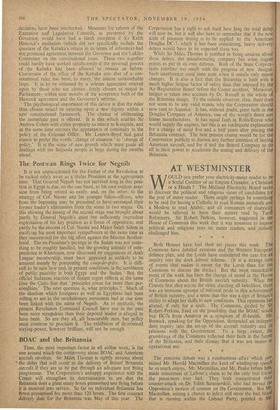The Postman Rings Twice for Neguib
It is not unprecedented for the Father of the Revolution to he tucked safely away as a titular President at the appropriate time. That General Neguib has not survived long in this posi- tion in Egypt is due, on the one hand, to his own evident aver- sion from being retired so easily, and, on the other, to the strategy of Col. Nasser and his younger fellow-officers, who from the beginning may he presumed to have envisaged their former leader's elimination from the scene .in two stages. On this showing the timing of the second stage was brought about partly by General Neguib's quiet but sufficiently imprudent exploitation of his key position as a focus of opposition; and partly by the success of Col. Nasser and Major Salah Salem in pacifying his most important sympathisers at the same time as they manoeuvred for the big effort against the Muslim Brother- hood. The ex-President's prestige in the Sudan was not some- thing to be roughly handled; but the growing attitude of inde- pendence in Khartoum, now illustrated by suggestions of Arab League membership, must have appeared as unlikely to be arrested merely by postponing the coup-de-grace. It is diffi- cult to be sure how real, in present conditions, is the 'semblance of public passivity in both Egypt and the Sudan. But, the official Sudanese reaction of distant regret reflects at the same time the Cairo line that `principles count for more than per- sonalities.' The next question is, what principles ? Much of the idealism which foreigners as well as Egyptians had been willing to see in the revolutionary movement had at one time been linked with the name of Neguib. As to methods, the present Revolution Command Council have not in the past been more scrupulous than their deposed leader is alleged to have been. So are they all, all honourable men, but policy must continue to proclaim it. The exhibition of de:ermined staying-power, however brilliant, will not be enough.










































































 Previous page
Previous page